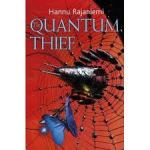Sensory deprivation tanks are weird things. They remove all sensory inputs from the inhabitant, who is left just… floating… presumably so that they can concentrate on just thinking.
The first couple of chapters of The Quantum Thief (by Hannu Rajaniemi) are the complete opposite of a sensory deprivation tank. Within just a few pages, the narrator dies and comes back to life, confronts a copy of himself, bemoans being in prison, is rescued by a woman having hallucinations, and discovers that he has been rescued in order to do what he does best: steal something. Descriptions are vivid, and I had the feeling of being swept along – like there was no time to lose, everything has to happen fast so get on with it! – an effect that never let up over the whole 330 pages.
The book switches perspective several times, which adds to the hectic feel. The main narrator – the only character whose perspective we actually share – is Jean le Flambeur, master thief. After being rescued by Miele (whose story is quite hazy, one of my few issues with the book as a whole) to undertake a theft, they travel to Mars, where Jean begins to remember things long forgotten that threaten to undermine… everything. I quite liked Jean; he’s from the urbane, amusing thief mould, with enough complexity that he never feels like a stereotype. In Jean’s story there are elements of the classic caper, like The Italian Job: we like the thief, and although we know stealing is wrong we’re still basically cheering him on. I enjoyed finding out more of his back-story, which deepened his complexity without changing the basics of who he is.
The other perspective that dominates the book is that of Isidore, a student moonlighting as a detective. His sections of the book have a detective noir feel that nicely complements Jean’s story. Isidore is commissioned to investigate a crime that hasn’t happened yet, which brings him into contact with all sorts of interesting people. And along with his semi-professional life, the reader is also brought into his personal life, made particularly difficult by the fact that he is dating a girl from the zoku colony – and zoku don’t usually mix with native Martians. Difficulties, of course, ensue. Again, I really liked Isidore. I was a bit concerned that he would turn out to be a naïve boy-wonder, but thankfully he’s a much better constructed character than that.
As a native of Mars, the reader gets a more intimate understanding of the place through Isidore than is possible from Jean’s (and Miele’s) tourist perspective; and a weird place it is, too. Isidore lives in a city floating above the surface of the planet; a city where rather than money, the inhabitants trade in time. (Gives a whole new meaning to the phrase time-poor.) Once your time is up, you become a Quiet for some unexplained period of time: physically changed into whatever sort of machine is required for the city’s maintenance, from an Atlas supporting the whole place to merely a personal servant. And then you get changed back, but of course the experience can’t help but have altered you. The other fascinating feature of Martian society is the privacy aspect. Everyone has a gevulot: essentially a privacy screen with different levels, allowing you to do everything from be visible to absolutely everyone, to completely invisible, with shades in between. In light of current concerns over personal privacy, this is an intriguing idea – as is the idea of choosing how much of your information is available to the people you meet. Quite the reverse of Facebook then.
The plot, essentially, revolves around the theft that Jean is to undertake, which isn’t actually revealed for quite some time. Weaved through this, though, are at least two love stories, a political discussion, several explorations of the self, and a bucketload of really cool and mind-blowing technology. So it’s not a simple caper-on-Mars story. In fact it’s not a simple anything; this is definitely not the book to give someone who has never read any science fiction. There is a lot of science in this book; it expects at least a passing knowledge of quantum mechanics and entanglement theory, as well as other bits and pieces. And it’s one of those books where many disparate parts only come together at the end – if you’re not aware of how that style works, this could be a very annoying book.
Rajaniemi has had numerous short stories published, but this is his debut novel. There has been a lot of hype about it being the best debut of 2010, and indeed one of the best science fiction books of 2010, period. For a debut, it is fantastic, but I am not convinced about it being one of the best books of the year. It’s certainly very good: the characters are mostly multi-faceted and well-developed, the plot is well-paced, and his vision of Mars is wonderfully imaginative. However, as I said before, I was disappointed that Miele is not more fully explained – there are tantalising hints about her background, but not enough to really come to grips with her motivations. Given that she is a fairly major character, this is a flaw. My other problem is with the conclusion. It bugged me. A lot. I felt that it came out of nowhere, and that it did not add to the plot. It was a disappointing note on which to end. As is this.

[…] of Season 2 Tansy – Feed, by Mira Grant, The Five Doctors easter egg commentary Alex – Quantum Thief (Hannu Rajaniemi), Zima Blue (Alastair […]